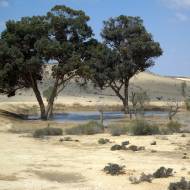
On February 19, 1936, Zionist leaders discussed how to confront proposed British restrictions on Jewish land purchases in the Land of Israel.

After the deadly 1929 Arab riots against a Jewish presence in Palestine, the Jewish Agency leadership went into an organizational crisis mode: how to confront a series of British-inspired inquiries all aimed at either stopping or slowing down Jewish growth in Palestine. Reams of information were presented to no less than half a dozen British bodies that looked at the issue of Jewish immigration, land purchase, and establishment of self-government.
To the Zionists’ good fortune, the Arab leadership in Palestine continued its past policy of boycotting these investigations. Zionist leaders were convinced that if more immigrants came to Palestine, they would bring more capital, which would raise the standard of living and give employment opportunities to many Arabs.
Indeed, in November 1938, British Secretary of State for the Colonies Malcolm MacDonald stated in the House of Commons, “The Arabs cannot say that the Jews are driving them out of the country. If not a single Jew had come to Palestine after 1918, I believe the Arab population of Palestine would still have been around 600,000 at which it has been stable under Turkish rule…. It is not only the Jews who have benefited from the Balfour Declaration. They can deny it as much as they like, but materially the Arabs have benefited very greatly from the Balfour Declaration.”
However, in the mid-1930s, the Zionists looked over their shoulder knowing that at some point, restrictions on Jewish development would be coming.
Chaired by Moshe Shertok (Sharett), the Jewish Agency convened a joint meeting of representatives of the Jewish National Fund and the Palestine Land Development Company. Attending this strategic discussion of how to face this threatening change in British policy toward Zionist growth were key Zionist leaders. More than two dozen such meetings would be held over the next several years, where the Zionists repeatedly evaluated their growth needs in light of pending British threats.
At this particular meeting, Shertok’s view held that the Zionists should engage actively with the British in shaping future laws, that the Zionists should seek British permission to purchase and settle on state lands not owned by Arabs, and that the British should do more to throttle Arab attacks on Jewish settlements. Menachem Ussishkin, a Zionist leader, took the view that no matter what the Zionists presented to British government offices, the British, regardless, were going to impose restrictions.
Ussishkin was proven correct when the 1939 British White Paper was applied, which throttled Jewish growth but did not stop it. A view was developing in these meetings that no matter what restrictions the British imposed, those rules and laws would be, as Yehoshua Hankin – a Zionist activist responsible for most of the major land purchases by the Zionist Organization in Palestine, both under Ottoman rule and, later, the British Mandate – worded it, “relentlessly opposed.”
Source: Center for Israel Education (Minutes of the Jewish National Fund meeting, February 19, 1936, Central Zionist Archives, Jerusalem).
Do You Support Israel?
Want to do something important for Israel? Make a donation to United with Israel, and help to educate and inspire millions around the world to support Israel too!
Now more than ever, Israel needs your help to fight the battle of public opinion. Israel’s enemies are using social media to incite brutal terror against innocent civilians. We need your help to fight back! Every day, we teach the truth about Israel to millions of people around the world.
In addition, United with Israel contributes to vital causes like building bomb shelters to protect Israeli citizens. Donations from true friends of Israel like you make this possible, so please show your support today!
Source: United with Israel

